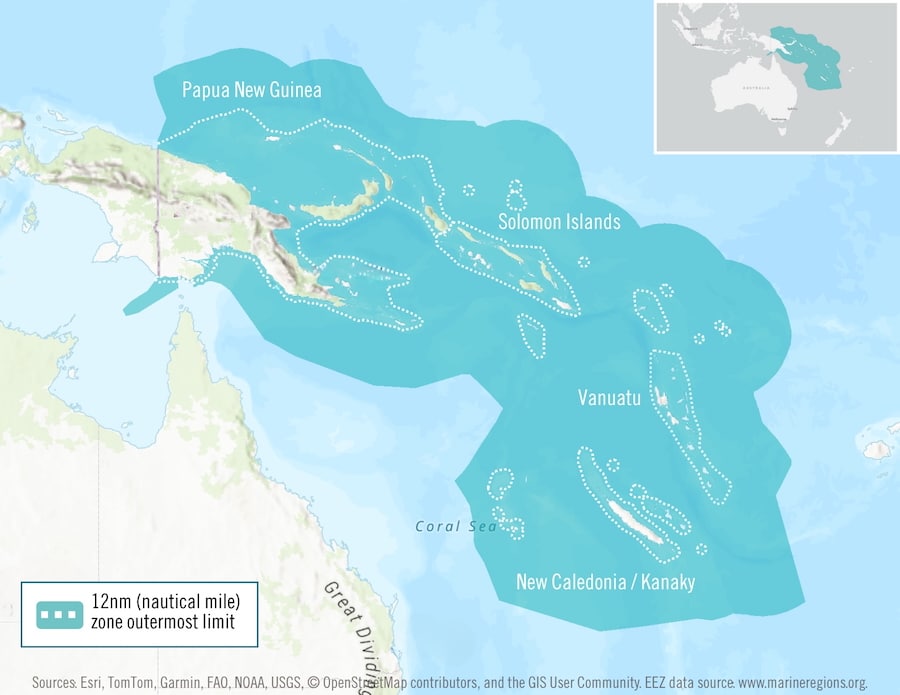This post was originally published on Eco Watch
During the recent United Nations Ocean Conference, the Solomon Islands and Vanuatu governments announced plans to establish the world’s first Indigenous-led multinational ocean reserve, the Melanesian Ocean Reserve.
The planned reserve will span the Solomon Islands’, Vanuatu’s and Papua New Guinea’s national waters and connect to the Exclusive Economic Zone of New Caledonia, another protected area. The Melanesian Ocean Reserve is set to cover more than 6 million square kilometers of a region with some of the richest marine biodiversity in the world.
The envisioned Melanesian Ocean Reserve. Image courtesy of the Melanesian Ocean Reserve
“For millennia, the Indigenous Peoples of Melanesia have been the wisest and most effective stewards of these sacred waters. That is why the governments of Melanesia are joining forces to create an unprecedented ocean reserve that honours our identities, livelihoods, and spiritual connections,” Solomon Islands Prime Minister Jeremiah Manele said in a statement.
Once complete, the new ocean reserve will be as large as the Amazon Rainforest, according to the Solomon Islands-based and Indigenous-led nonprofit Islands Knowledge Institute, which is collaborating with the Solomon Islands and Vanuatu in establishing the reserve.
Ecologist Edgar Pollard, leader of the Islands Knowledge Institute, said, “The Melanesian Ocean Reserve has progressed from an idea to a powerful platform amongst Melanesian leaders because it connects to an unmistakable truth in their lives: that treating the ocean as our home, in the deepest sense of the word, is the best protection.”
According to the Wildlife Conservation Society, the southwestern Pacific Ocean region is of great ecological and cultural importance, with extensive coral reef systems including 75% of known coral species and over 3,000 species of reef-dependent fish.
However, the region is under increasing threats from climate change, illegal fishing, and industrial trawling, among other concerns, as reported on the reserve website.
Already, Solomon Islands and Vanuatu have kept more than 150,000 square kilometers of the surrounding waters safe from exploitation, and they will now be able to extend their conservation efforts to an area more than 3.5 times the size of Alaska.
As part of the initiative, the nations plan to also provide further Indigenous knowledge on marine conservation, establish and support regenerative economies, prioritize sustainable infrastructure (including solar-powered and electric water vessels and solar power for local villages), and emphasize cultural vitality, including by only allowing customary activities in parts of the reserve.
As Mongabay reported, Papua New Guinea, which is expected to join in on establishing the reserve, has controversial deep-sea mining plans that are of concern into how they could affect the reserve.
However, Solomon Islands and Vanuatu are hopeful that this project could inspire more governments to expand their marine conservation efforts and limit exploitative activities.
“It is an objective of our National Ocean Policy to establish this transboundary corridor of traditionally managed ocean space between our countries, and we are delighted that this is now happening,” Vanuatu’s Minister for Environment Ralph Regenvanu said in a statement. “The Melanesian Ocean Reserve will give the governments and peoples of Melanesia the ability to do much more to protect our ancestral waters from those who extract and exploit without concern for our planet and its living beings. We hope our Indigenous stewardship of this vast reserve will create momentum for similar initiatives all over the world.”
The post Pacific Island Nations Announce Plans for Indigenous-Led Melanesian Ocean Reserve, a World First appeared first on EcoWatch.





0 Comments